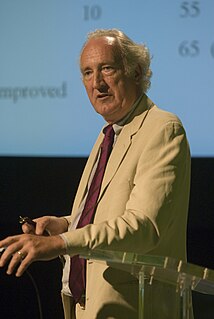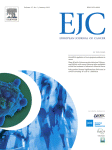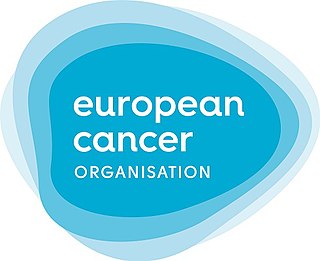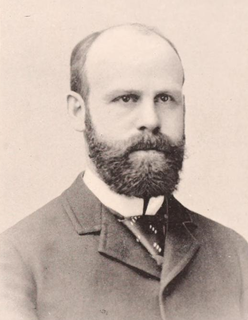
Cancer Research UK is a cancer research and awareness charity in the United Kingdom and Isle of Man, formed on 4 February 2002 by the merger of The Cancer Research Campaign and the Imperial Cancer Research Fund. As the world's largest independent cancer research charity it conducts research into the prevention, diagnosis and treatment of the disease. Research activities are carried out in institutes, universities and hospitals across the UK, both by the charity's own staff and by its grant-funded researchers. It also provides information about cancer and runs campaigns aimed at raising awareness of the disease and influencing public policy.
The Institute of Cancer Research is a public research institute and a constituent college of the University of London in London, United Kingdom, specialising in oncology. It was founded in 1909 as a research department of the Royal Marsden Hospital and joined the University of London in 2003. It has been responsible for a number of breakthrough discoveries, including that the basic cause of cancer is damage to DNA.

Cancer research is research into cancer to identify causes and develop strategies for prevention, diagnosis, treatment, and cure.
The Canadian Cancer Society is Canada's largest national cancer charity and the largest national charitable funder of cancer research in Canada.

The Union for International Cancer Control or UICC is a non-governmental organisation with over 1,200 member organisations in more than 170 countries.

The European Organisation for Research and Treatment of Cancer (EORTC) is a unique pan-European non-profit clinical cancer research organisation established in 1962 operating as an international association under Belgium law. It develops, conducts, coordinates and stimulates high-quality translational and clinical trial research to improve the survival and quality of life of cancer patients. This is achieved through the development of new drugs and other innovative approaches, and the testing of more effective therapeutic strategies, using currently approved drugs, surgery and/or radiotherapy in clinical trials conducted under the auspices of a vast network of clinical cancer researchers supported by 220 staff members based in Brussels. EORTC has the expertise to conduct large and complex trials especially specific populations such as the older patient and rare tumours.
Mitumomab (BEC-2) is a mouse anti-BEC-2 monoclonal antibody investigated for the treatment of small cell lung carcinoma in combination with BCG vaccination. Mitumomab attacks tumour cells, while the vaccine is thought to activate the immune system. It was developed by ImClone and Merck.

Professor John Gordon McVie BSc (Hons), MBChB, M.D., FRCP, FRCPE, FRCPSGlas, FMedSci, DSc was an international authority on the treatment and research of cancer. He wrote over 350 peer reviewed articles, editorials and books.
Martine J. Piccart-Gebhart is a Belgian medical oncologist. She is a professor of oncology at the Université Libre de Bruxelles (ULB) and scientific director at the Jules Bordet Institute in Brussels, Belgium. She is also a member of the Belgian Royal Academy of Medicine.

The National Health Service (NHS) is the umbrella term for the publicly-funded healthcare systems of the United Kingdom (UK). Since 1948 they have been funded out of general taxation. There are three systems which make up the "NHS". Health and Social Care in Northern Ireland was created separately and although it does not use the name "NHS" it is still often to referred to as such, particularly in reference to the overall health system in the UK. The four systems were established in 1948 as part of major social reforms following the Second World War. The founding principles were that services should be comprehensive, universal and free at the point of delivery—a health service based on clinical need, not ability to pay. Each service provides a comprehensive range of health services, free at the point of use for people ordinarily resident in the United Kingdom apart from dental treatment and optical care. In England, NHS patients have to pay prescription charges; some, particularly those receiving state benefits, are exempt.
The European Institute for Biomedical Imaging Research (EIBIR) was established in 2006 as a non-profit, limited liability company on the initiative of the European Society of Radiology with funding of the European Commission within the Sixth Framework Programme.

Oncology is a branch of medicine that deals with the prevention, diagnosis, and treatment of cancer. A medical professional who practices oncology is an oncologist. The name's etymological origin is the Greek word ὄγκος (óngkos), meaning 1. "burden, volume, mass" and 2. "barb", and the Greek word λόγος (logos), meaning "study".

The European Journal of Cancer is a peer-reviewed medical journal devoted to cancer research on experimental oncology, clinical oncology, and on cancer epidemiology and prevention. It is the official journal of the European Organisation for Research and Treatment of Cancer (EORTC), the European Cancer Organisation (ECCO), the European Association for Cancer Research (EACR) and the European Society of Breast Cancer Specialists (EUSOMA). The editor-in-chief is Alexander M. M. Eggermont.

The European Cancer Organisation is a not-for-profit federation of 34 Member Societies working in cancer at a European level, together with 20 European Patient Advisory Committee members. The Organisation is dedicated to convening oncology professionals and patients to agree policy, advocate for positive change and speak for the European cancer community. The European Cancer Organisation is the organiser of the annual European Cancer Summit.
Sir Michael John Peckham is a British oncologist and artist. As a cancer physician he is best known for his contribution to the treatment of testicular cancer. His paintings were first exhibited in 1962 and he has since shown in numerous mixed and solo exhibitions.

Patrick Schöffski is a medical doctor specializing in internal medicine, hematology and medical oncology. He originates from Hannover, Germany, where he also received a master's degree in public health at Hannover Medical School.
Europa Donna – The European Breast Cancer Coalition is an independent non-profit organisation whose members are affiliated groups from 47 countries throughout Europe. The organisation was set up by a group of women from various European countries in 1994. Its head office is in Milan, Italy.

Lucius Duncan Bulkley was an American dermatologist and alternative cancer treatment advocate.
Cancer is one of the underlying diseases that increases the risk of COVID-19 developing to a serious illness.